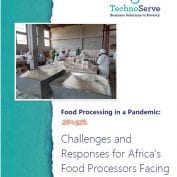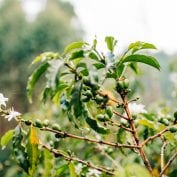
New Survey Finds African Food Processors Face COVID-19 Challenges
Food companies already report significant disruptions to marketing and distribution networks and eye future supply problems

Food companies already report significant disruptions to marketing and distribution networks and eye future supply problems

TechnoServe surveyed 106 food processors, representing seven countries in Africa, on the impact of COVID-19 on their operations. This survey presents our findings.

TechnoServe offers a guide on the challenges and responses facing food processors during the COVID-19 pandemic, based on a survey of 106 food processors from seven African countries.
In Kenya, the coronavirus pandemic is presenting new challenges for shopkeepers who must continue supplying their customers with essential goods, even amidst a global crisis. We talked to Alice Waweru, TechnoServe’s entrepreneurship regional program manager, about the challenges these micro-retailers are facing and what TechnoServe is doing to help.

As part of a consortium, TechnoServe is working to prevent stunting and malnutrition in Zambia through multi-layered interventions within health, WASH, agriculture and livelihoods, behavior change and other areas.

The Commercial Agriculture for Smallholders and Agribusiness Technical Assistance Facility (CASA TAF) will partner with investors to assess and demonstrate how inclusive technical assistance can strengthen the commercial viability and development impact of agribusinesses that source from smallholders.

TechnoServe is collaborating with Anglo American on providing enterprise development training to youth in response to South Africa's national priority of reducing unemployment and poverty.

This initiative offers a unique approach to supporting young entrepreneurs by creating several Box Shop stores in South African townships. This effort will support 240 young entrepreneurs to bring their products to store shelves and encourage more support for buying and building local brands.
In this series, we check back with TechnoServe program participants who were previously featured on our blog, documenting how their lives have changed and progressed.

The REgrow Yirga project funded by USDA, JDE, and Peet's Coffee, in partnership with Kew, aims to enhance the sustainable competitiveness of the Ethiopian coffee sector through increased productivity, improved supply chain performance, strengthened market linkages, and a more facilitative enabling environment.